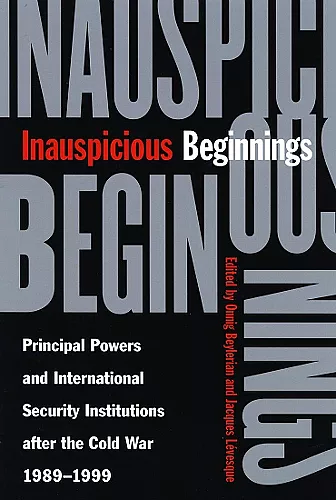Inauspicious Beginnings
Principal Powers and International Security Institutions after the Cold War, 1989-1999
Jacques Lévesque author Onnig Beylerian author
Format:Hardback
Publisher:McGill-Queen's University Press
Published:29th Mar '04
Currently unavailable, our supplier has not provided us a restock date

Shows the emerging 'new world order' was marked by the overwhelming power of the United States
Shows that at the end of the Cold War experts in the international community expected a new world order to emerge in which international security institutions - such as the United Nations Security Council and NATO - would play a major role in preventing and ending conflicts."Inauspicious Beginnings" shows that at the end of the Cold War many experts in the international community expected a new world order to emerge in which international security institutions - such as the United Nations Security Council and NATO - would play a major role in preventing and ending conflicts. But while the 1990s proved to be a decade of international insecurity and major humanitarian disasters, thus demonstrating the need for a wider and more efficient system of security institutions, the principal powers failed to create them. Instead, the emerging order was marked by the overwhelming power of the United States, which, under the Bush Sr and Clinton administrations, did not see such a system as a necessity.The authors detail how the Bush and Clinton administrations relied on catering to allies and building large coalitions to deal with major international security challenges, while other principal powers were either pre-occupied with their domestic problems or deferred to the United States. As a consequence, on the eve of 11 September 2001 the United Nations Security Council remained an older, outmoded power configuration incapable of responding efficiently to the with novel challenges besetting it. Its relevance has been further questioned by the unilateral occupation of Iraq by the United States.
"This book addresses an important theoretical and operational issue in contemporary international relations, namely, the role played by international security institutions in the foreign policy calculation of the major powers during the post-Cold-War era. It casts valuable light on the theoretical debate, pitting structural realists against institutionalists and constructivists. It is, to my knowledge, the only study focusing upon this particular set of actors and it is put together with the able contributions of an impressive set of country experts who are also conversant with the larger issues of IR." David Haglund, Sir Edward Peacock Professor of Political Studies, Queen's University
ISBN: 9780773526259
Dimensions: unknown
Weight: 580g
376 pages